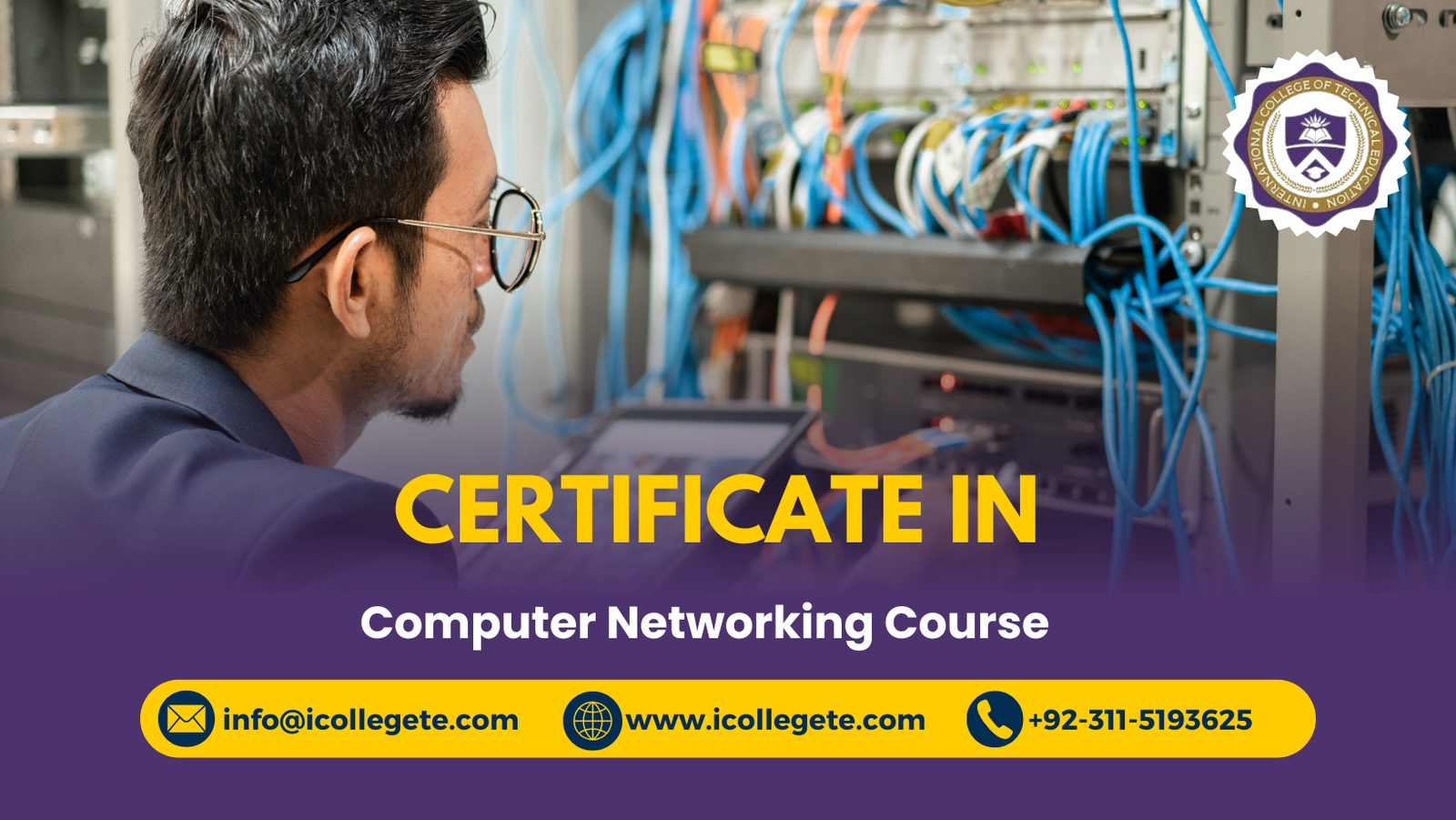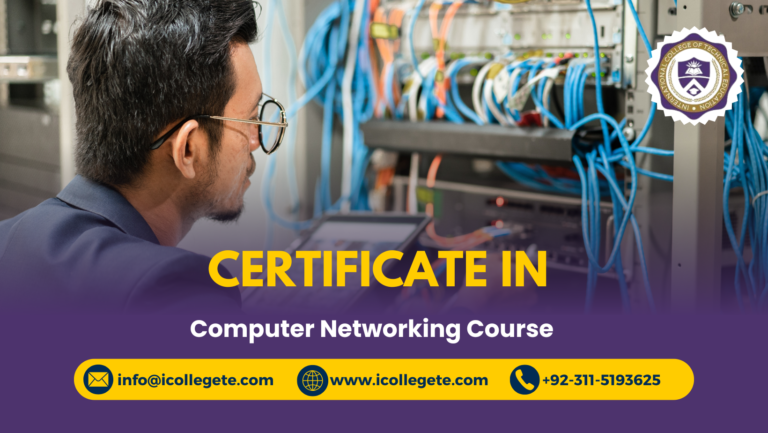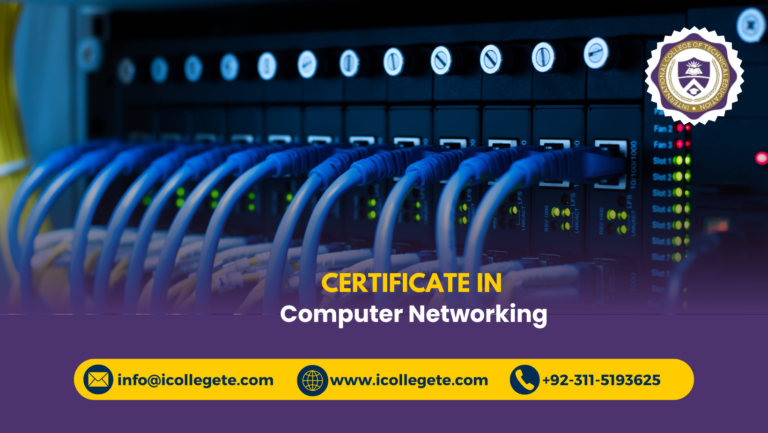In today’s interconnected world, understanding computer networking is crucial for anyone looking to pursue a career in IT, cybersecurity, or network administration. The Certificate in Computer Networking course offers an in-depth exploration of the essential principles and technologies that power modern computer networks. Whether you’re a beginner or looking to advance your skills, this course provides the knowledge necessary to build, manage, and troubleshoot computer networks.
The Certificate in Computer Networking course is designed to give learners a solid understanding of computer networks, from the basics to more advanced concepts. It covers key networking principles such as protocols, IP addressing, network devices, and security. Through practical exercises and hands-on learning, students will gain the skills needed to design, implement, and troubleshoot both small and large-scale networks. The course is ideal for individuals who want to start a career in networking or enhance their existing IT knowledge.
Course Overview
This course covers a wide range of topics that will equip students with a comprehensive understanding of computer networks. From the fundamentals of networking hardware to advanced concepts like network security and cloud networking, the course ensures a complete learning experience. Students will work with real-world networking tools and technologies, helping them apply theoretical knowledge to practical scenarios. By the end of the course, learners will be able to design, configure, and maintain a network infrastructure, making them valuable assets to any IT team.
Learning Outcomes
Upon successful completion of the Certificate in Computer Networking course, students will be able to:
- Understand Networking Fundamentals: Gain a strong foundation in the core concepts of networking, including LAN, WAN, and network topologies.
- Work with Network Devices: Learn to configure and troubleshoot network devices such as routers, switches, and firewalls.
- Master IP Addressing and Subnetting: Understand the intricacies of IP addressing, subnetting, and how to assign IP addresses to devices within a network.
- Implement Network Security: Understand the importance of network security and apply security measures to protect a network from unauthorized access and cyber threats.
- Troubleshoot Network Issues: Develop the skills to diagnose and troubleshoot common networking problems, ensuring smooth network operations.
- Design Network Infrastructure: Gain the skills to design and implement network infrastructures that support organizational needs, scalability, and reliability.
- Understand Emerging Networking Trends: Stay up-to-date with the latest trends in networking technologies, such as cloud computing, SD-WAN, and IoT.
Study Units
The Certificate in Computer Networking course is structured into several key study units, each focusing on different aspects of networking:
- Introduction to Networking: Understand the basic concepts of networking, including the OSI and TCP/IP models, network topologies, and communication protocols.
- Network Devices and Hardware: Learn about routers, switches, modems, and firewalls, and how to configure and manage them effectively.
- IP Addressing and Subnetting: Explore IP addressing schemes, subnet masks, and how to allocate IP addresses to devices in a network.
- Network Configuration and Management: Get hands-on experience with configuring network devices, setting up a network, and managing its performance.
- Routing and Switching: Learn advanced networking concepts like routing protocols (e.g., RIP, OSPF) and switching techniques to ensure data flows efficiently.
- Network Security Fundamentals: Explore key network security principles, including encryption, firewalls, VPNs, and secure protocols to safeguard network data.
- Network Troubleshooting: Learn to identify and resolve network issues using various diagnostic tools and techniques.
- Cloud Networking and Emerging Trends: Understand how cloud technologies are transforming networking, and explore new trends such as SD-WAN, IoT, and 5G.
Course Benefits
- Increased Job Opportunities: The demand for skilled network professionals is growing, and this course opens doors to a variety of networking roles such as network administrator, systems administrator, and IT support specialist.
- Hands-on Experience: Practical exercises, lab work, and real-world scenarios ensure that students gain the skills needed to configure, troubleshoot, and manage networks confidently.
- Foundational IT Knowledge: In addition to networking, you’ll develop a strong understanding of IT infrastructure and systems that will serve as a foundation for further study in fields like cybersecurity, cloud computing, and systems administration.
- Enhanced Problem-Solving Skills: The troubleshooting and diagnostic exercises will help you develop critical thinking and problem-solving skills that are highly valued in the tech industry.
- Industry-Relevant Skills: This course ensures that you stay up-to-date with the latest networking technologies, trends, and best practices, making you a competitive candidate in the ever-evolving IT industry.
- Flexible Learning: Many certificate programs offer online or self-paced learning, providing flexibility for students with varying schedules or those balancing work and study.
Who Is This Course For?
The Certificate in Computer Networking course is suitable for a wide range of individuals:
- Aspiring IT Professionals: Those who want to pursue a career in IT, network administration, or systems management.
- Current IT Staff: Professionals who already work in IT but want to enhance their knowledge of networking or advance in their career.
- Tech Enthusiasts: Anyone with an interest in technology who wants to understand how networks function and are managed.
- Career Changers: Individuals from non-technical backgrounds who are looking to transition into the IT field.
- Small Business Owners: Entrepreneurs who want to understand networking basics to improve their own business infrastructure and security.
- Students: High school or college students looking to explore IT or computer science as a future career path.
The Certificate in Computer Networking course offers a comprehensive education in networking principles, from the basics to advanced configurations and security measures. Whether you’re new to the IT field or looking to enhance your existing skills, this course provides practical, real-world knowledge that will prepare you for a successful career in networking and IT infrastructure. With hands-on experience, a strong focus on troubleshooting, and an understanding of emerging trends in networking, this course is an excellent choice for anyone looking to excel in today’s digital world.






